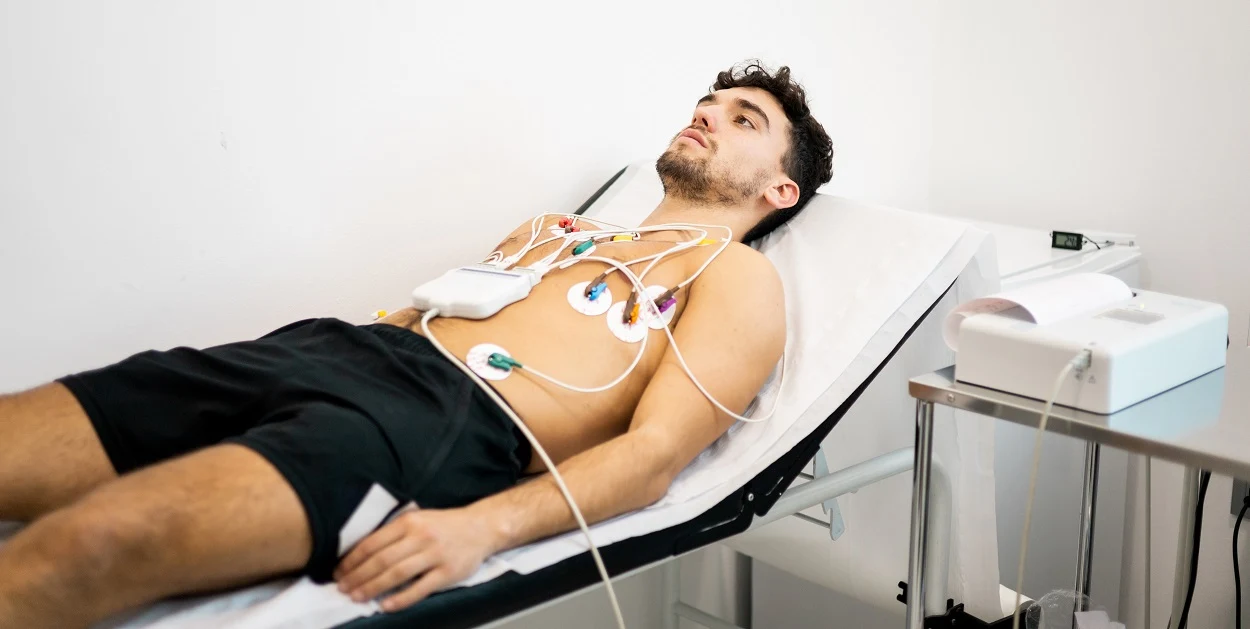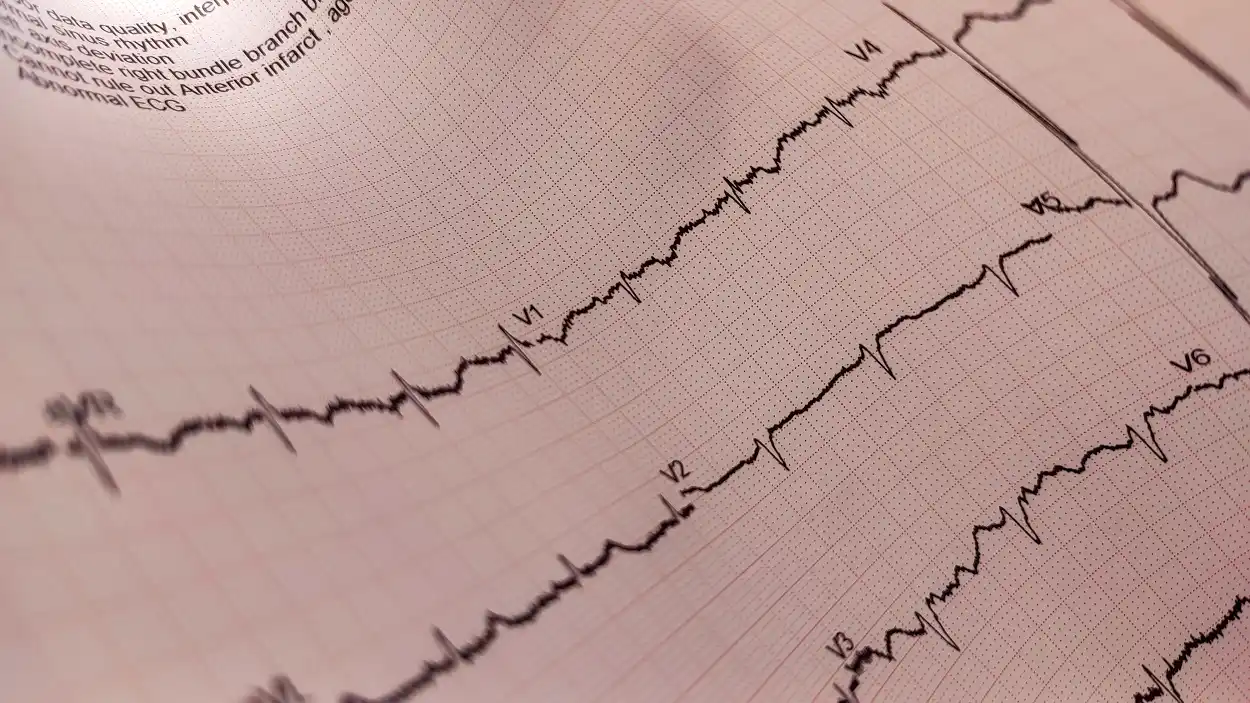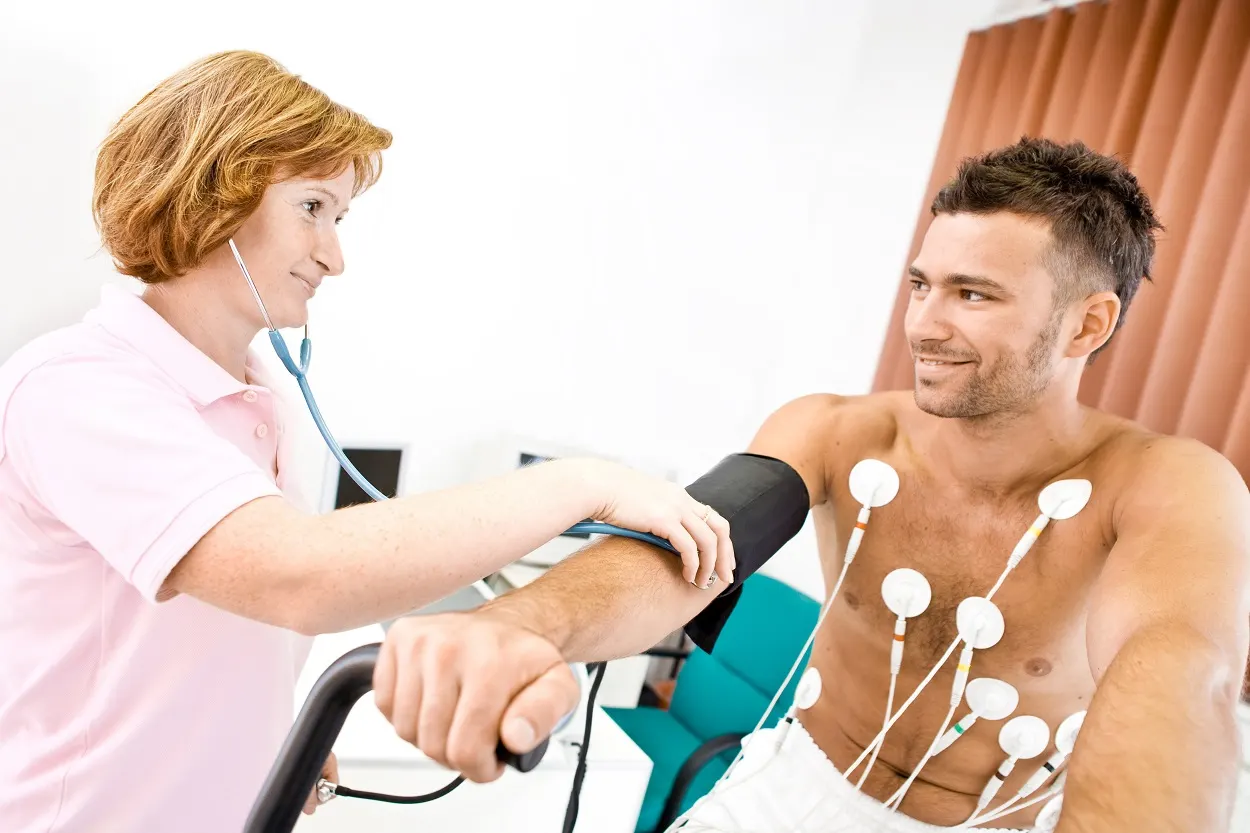Electrocardiogram (EKG/ECG)
What Is an EKG/ECG?
An Electrocardiogram (EKG) is a simple, common procedure done in your cardiologist’s office by a cardiovascular technician, nurse, or medical assistant. An EKG is a quick way to see if the electrical system of your heart is functioning normally. Your heart’s electrical activity controls its rhythm, making it beat regularly and consistently. An EKG helps your doctor see how strong these electrical signals are, how frequently they occur, and if they are creating a regular heartbeat.
What Happens During an EKG Test?

An EKG is a quick and painless test to check heart condition. It requires having electrode stickers put on your chest to capture your heart’s electrical impulses. Here’s what you can expect:
- Preparation: You’ll be asked to lie down on a table and remove any jewelry that might interfere with the test.
- Electrode Placement: Small electrode patches will be placed on your chest, arms, and legs. These patches are connected to the EKG machine by wires.
- Recording: You’ll need to lie still for a few seconds while the EKG machine records the electrical activity of your heart.
You’ll be monitored closely during the procedure, and rest assured that our team will be there to answer any questions you may have and ensure a comfortable experience.
Types of EKG Services
There are different types of EKGs that can offer a more detailed view of your heart’s function, depending on your individual needs. It’s important to understand that your doctor will choose the most appropriate type of EKG based on your individual needs and the reason for the test.
Resting EKG
This is the most common type of EKG and is performed while the patient is at rest. It provides a baseline assessment of the heart’s electrical activity. The patient lies down on a table while small electrode patches are attached to their chest, arms, and legs. These sticky patches are connected to an EKG machine that records the electrical signals produced by the heart.
Stress Test
To assess your heart’s response to physical exertion, your doctor may recommend a stress EKG.
Holter Monitor
This involves wearing a portable EKG device for a longer period, typically 24 hours or more, to monitor the heart’s rhythm over time. It’s used to detect subtle abnormalities that might not be visible during a single EKG recording.
The patient wears a small, lightweight device that continuously records their heart rhythm. They can go about their normal daily activities while wearing the monitor.
Event Monitor
Similar to a Holter monitor but worn for a longer period, often a few days or weeks. It’s used to record the heart’s electrical activity when the patient experiences specific symptoms, such as chest pain or dizziness.
The patient will carry a small device that they can activate when they experience symptoms. This records their heart rhythm during the episode.
How Long Does It Take to Get EKG Results?

The EKG results are usually available very quickly. Once the results are in, your doctor will thoroughly review them with you, explain what they indicate, and answer any questions you might have. This allows for efficient diagnosis and helps your doctor create a personalized treatment plan if necessary.
Why Do I Need an EKG?
An EKG can help your doctor diagnose and monitor a wide range of heart conditions. It’s often ordered if you experience any of the following symptoms:
- Chest pain: Chest pain can be a sign of coronary artery disease (CAD), a heart attack, or other heart problems.
- Shortness of breath: This can indicate heart failure, lung problems, or other issues that affect your heart’s ability to pump blood effectively, potentially leading to poor blood flow to the body.
- Dizziness or lightheadedness: These symptoms can sometimes be caused by problems with your heart rhythm, such as atrial fibrillation.
- Extreme tiredness or weakness: This can be a sign of heart problems, especially if it’s a new or unusual feeling.
- Fast or irregular heartbeats: This can indicate a heart rhythm disorder that requires medical attention.
- High blood pressure: High blood pressure can put a strain on your heart and increase your risk of heart disease.
- Family history of heart disease: If you have a family history of heart defects, your doctor may recommend an EKG to assess your risk and monitor your heart health.
- Enlarged heart: An EKG can help detect an enlarged heart, which could be a sign of heart disease or other conditions affecting the heart muscle.
These symptoms and conditions are strong reasons to get an EKG, so be sure to consult with your doctor.
How to Prepare for an EKG Test

Preparing for an EKG is straightforward, but it’s helpful to understand what to expect.
- Inform your doctor: It’s important to let your doctor know about any medications you’re taking, including over-the-counter medications, vitamins, and supplements.
- Wear comfortable clothing: You’ll be asked to remove your shirt and/or change into a hospital gown for the test, so wear clothes that are easy to take on and off.
- Remove jewelry: Remove any jewelry that might interfere with the test, including necklaces, bracelets, and earrings.
- Ask questions: Don’t hesitate to ask your doctor or technician any questions you might have about the test. They are there to help you feel comfortable and prepared.
On the day of your appointment, arrive on time so you can complete any necessary paperwork and get settled in. After the EKG test, you can return to your normal activities. Your healthcare provider will review your EKG results and discuss them with you
Why Choose CardioCare for EKG Services?
- Our team of highly skilled, board-certified cardiologists brings over 15 years of experience to every patient.
- State-of-the-art technology ensures accurate diagnoses and effective treatment plans to provide the most comprehensive care.
- Clear communication, the time to listen to your concerns, answer your questions, and explain your EKG results in a way you can understand is easy for us.
- A comfortable and convenient experience for every patient is one of our main priorities.
The actual recording of your heart’s electrical activity during an EKG takes only a few seconds. However, the entire appointment, including preparation and discussing the test results with your doctor, might take around 15-30 minutes.
ECG and EKG are the same thing – they both stand for electrocardiogram. ECG is the more common abbreviation used in medical settings, while EKG is more widely recognized by the public.
If your EKG results show any abnormalities, your cardiologist will explain the findings in detail and recommend a course of action based on your individual needs. This may include further testing or a change in your treatment plan.
The cost of an EKG varies depending on your insurance coverage. Contact us at (301) 656-5050 to discuss your insurance benefits and potential costs associated with your test.
Yes, it’s safe to have an EKG while pregnant. In fact, EKGs are often used to monitor heart health during pregnancy. Your doctor will advise you on the best approach based on your individual circumstances.